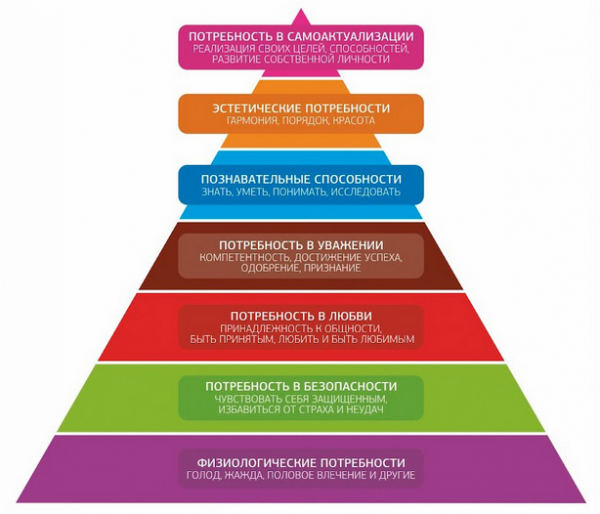
What is self-realization? Can the process of self-development to continue indefinitely, or someday we will finally say to myself – here it is, a happy ending?The deal will help the new study, “Individual perception of self-realization: what functional motives related to the potential?” in the online edition of Personality and Social Psychology. The author made Jamie Krems, Dr. social psychology, Arizona state University and her colleagues. Scientists used the ideas of evolutionary biology to challenge some traditional assumptions about what it means self-realization, writes likar.info.
The traditional view of self-actualization is the top of the famous pyramid of Abraham Maslow. In fact, a favorite example of self-actualization according to Maslow is playing guitar or writing poetry in their fun.

Maslow Pyramid. Photo: likar.info
But if you look at the evolutionary aspect of human behavior, it is unlikely that our ancestors evolved to solve the problems of survival, found friends, got status, and defeated enemies simply to entertain yourself. From an evolutionary point of view, the potential is self-improvement. Not just a musician, and a virtuoso musician, not just a philosopher or a physicist, a scientist, a connoisseur. All of this provides individual social benefits: the respect and affection of other members of society and the attention of a potential partner.
The research team asked a single question 1200 College students: “What will you do if you realize your potential?” The convergence of responses they checked with fundamental and evolutionary significance of social motives (e.g., friends, being, caring for relatives). Scientists have made the assumption that most people self-actualization need to achieve status (for example, to get only high scores in school, to become famous in his line of work).
The assumption proved to be correct, the majority binds the fulfillment of achieving status and respect.
When people think about achieving meaning in life (psychologists call this eudemonism well-being) and global life satisfaction (subjective well-being), they talked about spending time with friends and family. When it came to getting pleasure and avoiding pain (hedonic well-being), they focused on finding a new romantic/sexual partners, and the preservation of health.
The team was also able to give a scientific explanation to what have long referred to Maslow, is that different people achieve fulfillment in different ways. Criteria such as gender, age, relationship status and education influence the choice of goals for self-realization. For example, single people stressed that finding new romantic partners is part of their self-realization, while people who are in a relationship and consider part of self-exploration and maintaining existing relationships. At the same time, parents, especially young children, call the child care a core part of their self-realization.
Trying to find a partner, maintaining existing relationships, as well as taking care of children, people can feel samorealizatsii. In addition, it has biological importance, as, ultimately, aimed at passing down their genes to the next generation.
Thus, the quest for fulfillment is not “above” the biological and social needs, it is part of these processes. Self-realization leads to the achievement of biologically significant goals.







